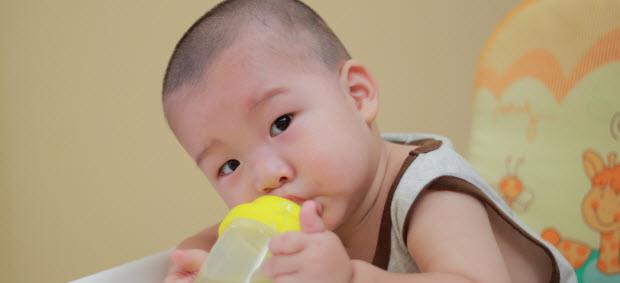Not only adults, children also need to replenish water every day, especially in hot days to avoid dehydration of the body. However, those are babies over 6 months old. For children under 6 months old, drinking water is not only unnecessary but can also lead to serious health effects.
Unlike adults, the diet for babies, especially infants and children under 6 months old, needs a lot of “taboo”. Even filtered water, fruit juices are also listed "black list" - the baby foods to avoid.

Not only is it unnecessary, giving babies under 6 months of age to drink water also leads to negative effects
As recommended by health experts, babies who are exclusively breastfed for the first 6 months do not need any extra water or any other liquid other than breast milk, even in hot weather. bear the most. Only in special cases and under the guidance of specialists, do mothers need to supplement the baby with water. Not only fully breastfed babies, according to experts, for cases where babies drink formula milk , adding filtered water to the baby's diet is also unnecessary.
The reason is that the water requirements of infants and young children during this period are often not much, and the amount of breast milk for babies to drink each day has met the baby's needs. Experts have also conducted research on children's water needs in different temperature and humidity environments. Even in the case of temperatures up to 41 degrees Celsius, and humidity 96%, breast milk still meets the needs of fluids needed for the baby.
In addition, according to experts, giving infants and children under 6 months of age to drink water can also cause many negative health effects . Not only seriously affects the weight and height development of the child, but training the baby to drink water too early also affects the safety of the child's life.

Nutrition for the baby: How is drinking water enough? Children aged 0-6 months are when their kidneys are still very weak, unable to be eliminated. If mothers give a lot of water, the amount of water that is not excreted will accumulate in the body and in the blood. The sodium in the blood lowers and leads to water poisoning, affecting the brain nerves, so children ...
1 / Affect the digestive system
According to research, children who drink more water outside are at risk of diarrhea 2 or 3 times higher than babies who are exclusively breastfed. The reason is that the immune system and the digestive system are still quite weak, so the baby will easily get diarrhea if the water is not guaranteed.
2 / The risk of malnutrition, underweight
Although it does not taste as sweet as milk, but compared to milk, have you noticed that most babies are still especially "biased" to water? Even many babies cry continuously when their mothers breastfeed, but they are obedient when they are given water by their mothers.
Babies drink too much water, leading to a significantly reduced daily milk consumption, and reduced nutrient intake. Besides, water does not provide energy or any nutrients, but it can make your baby feel full. This is the reason why babies who are trained to drink water too early will have the risk of malnutrition, lower weight than babies who are exclusively breastfed.
3 / Water intoxication
Water intoxication occurs when too much water reduces sodium levels in the body, disturbs the electrolyte balance, and causes tissues to swell. In rare cases, giving your baby too much water can develop into this condition, and if not treated promptly, the baby is very susceptible to coma. When the baby shows signs of irritability, drowsiness, dizziness, psychological change, and convulsions, the mother should take him to the hospital immediately.
If you give your baby formula milk, mothers should mix the recommended dosage on the package. Do not add or reduce the amount of water voluntarily. This not only increases the child's risk of water intoxication, but also reduces the amount of nutrients the child can absorb.
However, according to nutrition experts, mothers do not need to be too strict with the amount of water a child consumes each day. After breastfeeding a baby, a mother can rinse her tongue with a small gulp of water, but should not exceed 30 ml of water per day.
>>> See more discussions with related topics:
Health and nutrition for children from 1-12 months old
Should for babies to drink?













